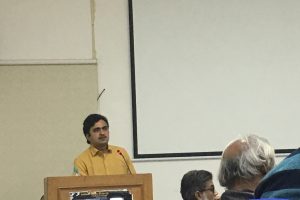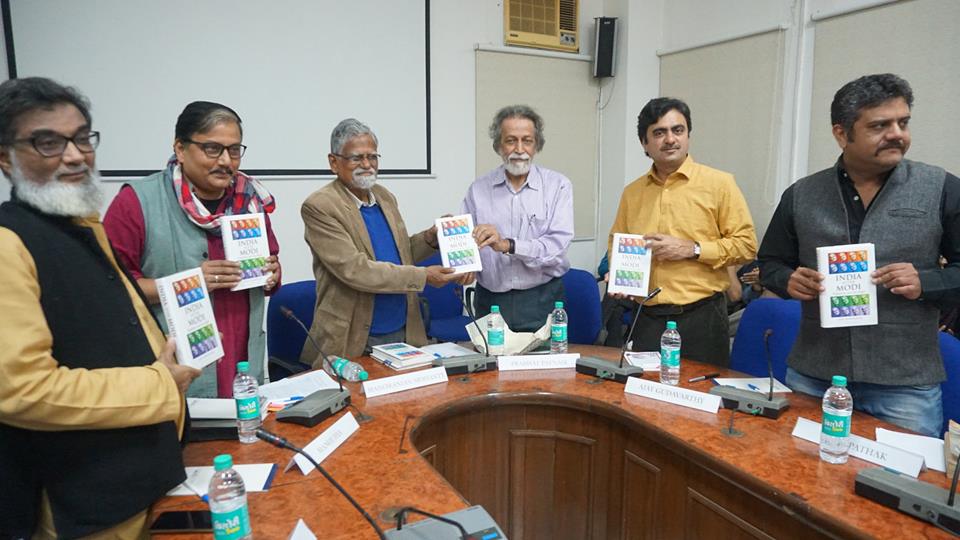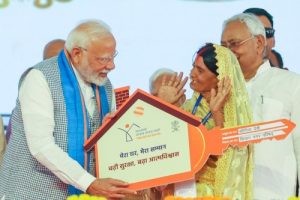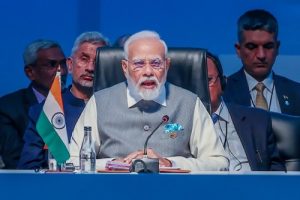There was an informed debate and discussion on the release of Prof. Ajay Gudavarthy’s book, INDIA after MODI — — Populism and the Right. Prof. Prabhat Patnaik released the book. Prof. Manoranjan Mohanty chaired the panel discussion where Prof. Manoj Jha, Zia Us Salam and Vikas Pathak discussed on the book. A houseful audience attended the discussion. SSS Committee Room, SSS I, JNU, 20 Nov 2018. Source: Samim Asgor Ali, Youtube.
Start with the introduction, the author assumed that, “Democracies across the globe have taken a populist turn, with the rise of Trump in the United State (US), at the onset of Brezit in United Kingdom (UK) and with Narendra Modi in India. Most populist regimes, perhaps with the axception of Podemos in Spain, have all been Right wing, notwithstanding the local-national specificities. In other words, populism across the globe has certain common features, including the ability to create people, projecting a strongman, polarizing between ‘us’ and ‘them’, moralization of power and exclusion, mobilizing emotions and passions, bringing the private to the public, and replacing the institutional mode of pursuing politics and governance with street mobilization, among others. Intro part of the book, Populism and the Afterlife of Democracy, Prof., Ajay Gudavarthy, JNU.
Read Also, Strengthen BJP at the grassroots: PM Narendra Modi to cadre
Manoj Jha at the release of Ajay Gudavarthy’s book, INDIA after MODI — Populism and the Right. Video.
Moreover, The materiality of the structures has become dispersed through global network that are post-Westphalian, invisible, staggered, and therefore, difficult to locate as sister or targets of resistance. Progressive Left militant politics of various hues were based on the reading of politics as outcomes of clear effect of structural dislocation, palpable inequalities, declining quality and standard of living, and visible national or local targets for mobilization, which would produce new kind of commonality in resistance either as a class or as ‘multitudes’.
Prof. Prabhat Patnaik on Ajay Gudavarthy’s book, INDIA after MODI — Populism and the Right.
Meanwhile, in the review of book, which eschews mere moral condemnation of the Right in India to analyse its current ascendancy, and the corresponding stasis of the Left and Liberal forces, is a bold and imaginative work by a political theorist. No matter how one reacts to the author’s arguments, they demand one’s serious engagement.” – Prabhat Patnaik, Emeritus Professor, Jawaharlal Nehru University, New Delhi.
Significantly, the author pointed out that, It is a situation that mobilizes ‘resistance’ or perhaps negotiations, which could be a batter way of putting it without a deep sense of hope or conviction for dramatic social change. It is a unique historical moment that is marked by what I would refer to as ‘Conformist Opitimism’, “India After Modi: Populism and the Right”.
Prof. Manoranjan Mohanty on Ajay Gudavarthy’s book, INDIA after MODI — Populism and the Right.

Populism has brought to the fore an explosion of the ‘irreducibilityly of multiplicity’-differences that cannot be reconciled. It has signified a simultaneous politicization of trends that were understood to represent democracy and also its counter-narratives. What is clear is that democracy cannot continues without resolving its ‘other’. Does this mean that politics will only be about moderating conflicts and not overcoming them? Does it mean containing social conflicts from spilling over the excess of their violent selves without concern for deeper compassion and solidarity? Does it signals a ‘new’ kind of democracy and coexistence or a victory of majoritarianism? Does populism signify the renewed claims of the dominant over the dominated or the claims of the subaltern against the elite? etc..
Zia Us Salam at the release of Ajay Gudavarthy’s book, INDIA after MODI — Populism and the Right.
Read Also, Pointers to right-wing social engineering
In India, it means a resurgent and a victorious Rights with claims to establishing a Hindu Rashtra, or alternatively, a politics that has exhausted the agenda of the right by extending the limits of Progressive politics. The right has articulated many aspects that have remained on the sidelines because of how modernity has institutionalized contemporary democracies. The left-prograssive have often morally rejected the performative dialectics of the Right either as opportunism or as mere doublespeak, such as what it did with the Dalit-Bahujan politics in the previous round of the democratic upsurge’.
Read Also, DU Recommends Removal of Dalit Writer-Activist Kancha Ilaiah’s Books from Syllabus
Vikas Pathak discussed on the book. A houseful audience attended the discussion. SSS Committee Room, SSS I, JNU, 20 Nov 2018. Source: Samim Asgor Ali, You Tube.
The Rights has been accused of spreading lies, fabricating evidence, manipulating, sparking and organizing violence, igniting riots, and lynching; however, the legitimacy of the Right does not come from these. The Right is assumed to be using force, violence, intimidation, and extrajudicial methods when others strategies fail to normalize its politics without remaining or being force, violence, intimidation, and extrajudicial methods when orther strategies fail to normalize its politics without remaining or being an exception..
The strongman phenomenon that lies at the core of populism operates through a complex maze of symbolic gesture, Prof. Ajay Gudavarthy, JNU.
In short, India after Modi attempts to address many leading discourse by an analysis of events like Award Wapsi, Dmonetization, the crisis in JNU and Higher Education, electoral outcomes, including in the states of UP, Bihar, Delhi. The author, Focuses exclusively on Indian democracy after Narendra Modi took over as the prime minister in 2014. The Author looks at the politics that India has been witnessing since then and addresses emerging issues in Indian democracy, including that of women’s participation, new urban spaces, and the role of youth.
Inputs were followed by the book, “India After Modi: Populism and the Right”.
























